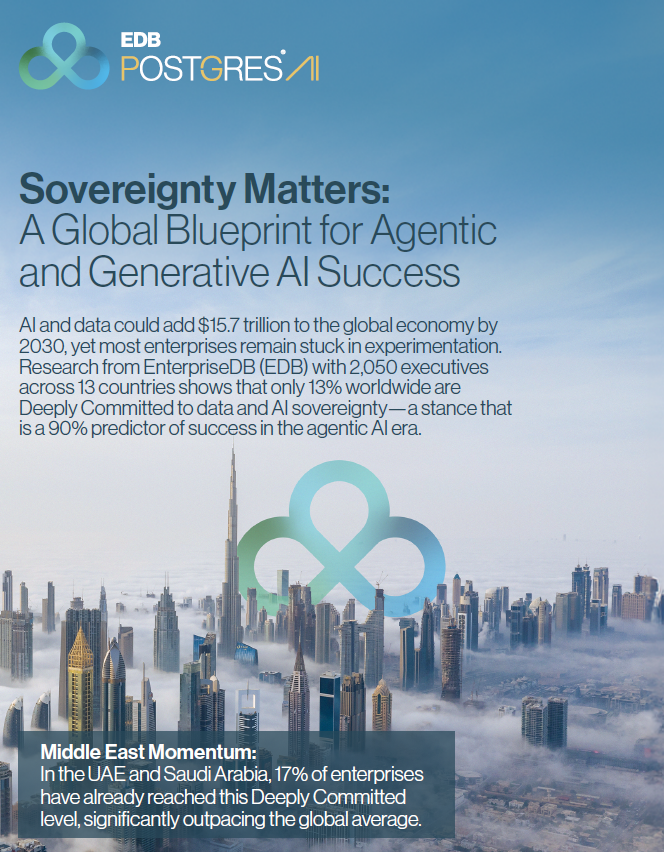GITEX showed the momentum. The story now is how the Middle East is turning sovereignty into a working model for AI, with collaboration, infrastructure, and intent
GITEX Global 2025 offered more than a week of product launches and panels. It marked a clear turning point in how the Gulf approaches AI. Conversations across the event pointed to the same shift: enterprises here are not experimenting on the margins; they are building AI into the core of their economies, and they are doing so in a sovereign manner.
As EDB CEO Kevin Dallas put it during an interview in Dubai with Roya TV, 95% of organizations in the region plan to invest in sovereign data and AI platforms within three years, and 17% already have.
Why the Middle East leads
The region’s success partially stems from its alignment. Governments have laid out explicit digital and AI strategies—from the UAE AI Strategy 2031 to Saudi Vision 2030—that connect policy, infrastructure, and skills development. Enterprises and technology partners are executing against that shared framework, translating national ambition into enterprise capability.
It’s also structural. Massive data-center projects such as Stargate in the UAE and HUMAIN in Saudi Arabia are expanding sovereign compute and storage capacity by the gigawatt, while new AI labs and joint research programs are embedding innovation directly into local ecosystems. The region is building for resilience and efficiency, with data centers optimized for energy performance, local control, and open architecture.
And unlike many markets that separate regulation from innovation, the Gulf is designing both in tandem. Clear governance frameworks—including the UAE’s guidelines on AI-generated content—give enterprises the confidence to scale responsibly.
A culture of partnership
Every step forward here happens collaboratively. Public agencies, local system integrators, and global technology providers share a clear bias toward building together.
That was evident throughout GITEX: workshops, partner meetings, and co-innovation sessions filled every day. The most common phrase in our team’s notes was “partner, partner, and partner.” Sovereignty in this region isn’t about isolation—it’s about coordination. That ecosystem model, where capabilities are pooled and success is shared, is what enables such rapid progress.
EDB’s own regional presence reflects that same philosophy. Our Dubai headquarters, opened this year, anchors our long-term investment in local collaboration. It serves as an enablement hub for partners and customers across the Middle East, Africa, and Turkey, hosting workshops, technical training, and co-development programs that build local capacity.
What sovereignty in the Middle East looks like
Seventeen percent of enterprises in the Gulf have reached what EDB’s Sovereignty Matters research calls the "Deeply Committed" stage, well above the 13% global average, and the gap is widening each quarter.
What “Deeply Committed” means:
In the study, the Deeply Committed are the top performers who have made full sovereignty over their data and AI mission-critical. They have:
- Unified data and AI platforms that eliminate silos and integrate transactional, analytical, and AI workloads.
- Hybrid cloud environments designed for both performance and compliance; about 49% of their workloads run across clouds and on premise.
- Built-in governance and observability, allowing them to monitor security, residency, and performance in real time.
- Open technology foundations, often using Postgres, to stay agile and avoid vendor lock-in
And the results are tangible:
- 5x higher ROI on AI investments
- 2x more agentic and generative AI applications in production
- 2.5x greater confidence in their ability to lead their industries within three years
Enterprises in the UAE and Saudi Arabia are achieving these outcomes faster because the region approaches sovereignty as both policy and practice. Banks, telecoms, and manufacturers are designing for sovereignty from day one, standardizing on open data platforms like Postgres, deploying AI within hybrid estates, and embedding sustainability and skills programs into their buildouts.
From GITEX snapshot to sustained movement
What GITEX captured was a snapshot of a larger transformation already in motion. The Gulf has proven that open ecosystems and clear policy can accelerate innovation without sacrificing control. Their model blends national strategy with enterprise execution, creating an environment where AI growth is both fast and accountable.
As Kevin Dallas described it, the region is rapidly becoming the Silicon Valley of sovereign AI: a place where infrastructure, governance, and innovation converge to define how intelligent systems will operate globally.
For EDB, that alignment of vision and execution is exactly what sovereignty was meant to enable. Through EDB Postgres® AI (EDB PG AI), we’re helping enterprises across the globe build on that foundation: unifying data, accelerating AI, and doing it all on infrastructure they own and control.
The momentum from GITEX was real, but the movement that follows is even more important, one that turns sovereignty from an aspiration into an enduring competitive advantage for the region.
Explore more
- Read Kevin Dallas’ interview in TahawulTech: The Middle East leads the global race to build sovereign AI platforms—on how the Gulf’s alignment of policy, infrastructure, and open technology is shaping the next phase of enterprise AI.
- Get the research: Download the Sovereignty Matters Report—insights from 2,000+ executives across 13 economies.
- Check your posture: Take the Sovereignty Self-Assessment to see where your organization stands.
- Learn more about EDB PG AI: Platform overview—how open, hybrid, and sovereign infrastructure enables data and AI under your control.

